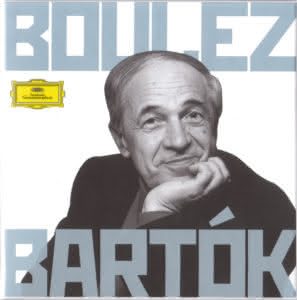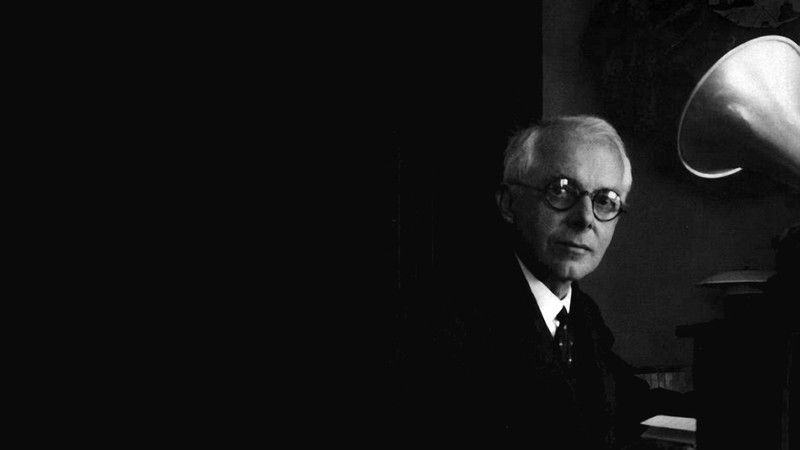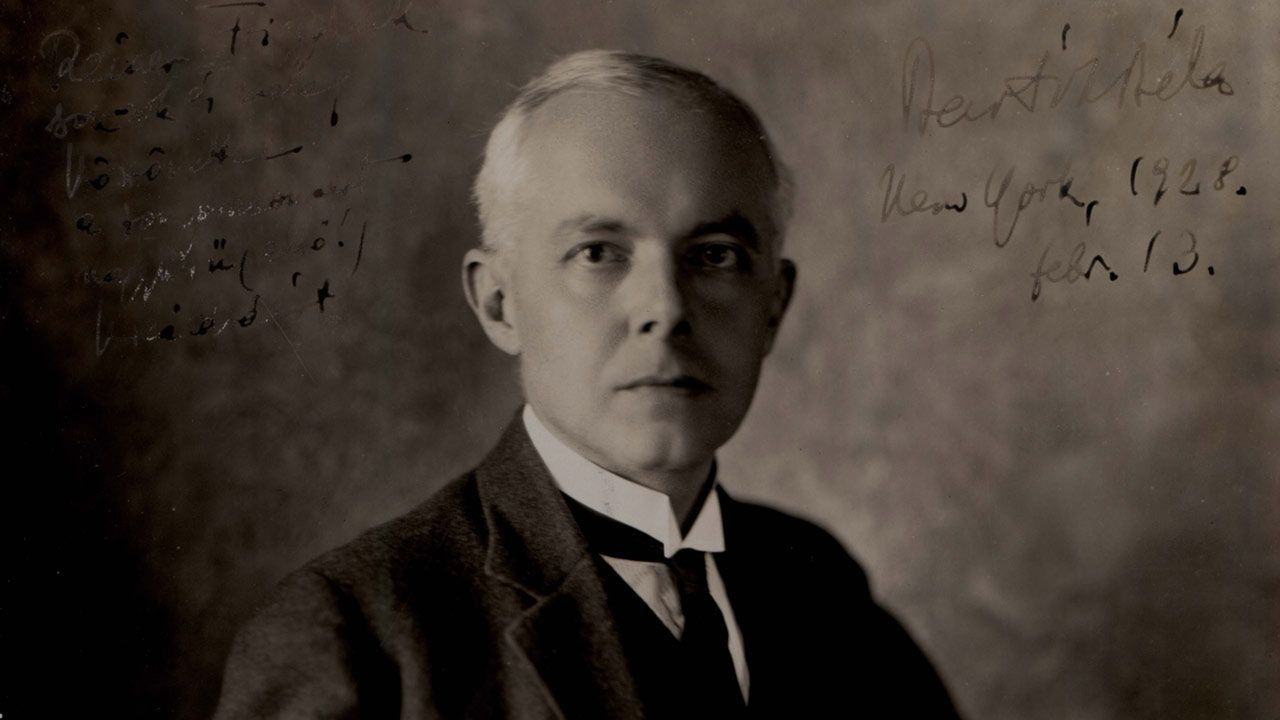ATENDENDO A DIVERSOS PEDIDOS ESTOU MAIS UMA VEZ RENOVANDO OS LINKS DESTA HISTÓRICA POSTAGEM, UMA DE MINHAS FAVORITAS, NÃO APENAS PELA QUALIDADE DA MÚSICA MAS TAMBÉM PELO TALENTO DESTE MÚSICO EXTRAORDINÁRIO CHAMADO PIERRE BOULEZ.
IM-PER-DÍ-VEL !!!
Link revalidado por PQP, que não admite que esta extraordinária, notável, imbatível caixa esteja indisponível. (Pequena apresentação da repostagem de 2014)
Várias vezes declaramos aqui no PQP Bach nossa admiração e apreço pelo compositor hungaro Bèla Bartók. E também já declarei minha admiração pelo regente e compositor francês Pierre Boulez. Admiro mais sua carreira como regente, pois conheço pouco sua obra enquanto compositor.
Mas Boulez é o grande nome nesta caixa que ora começo a postar para os senhores. Desde a primeira vez que o ouvi como regente foi admiração imediata, digamos assim. Trata-se de um maestro mais afeito ao repertório do século XX, com poucas incursões no repertório do século XIX, com destaque para sua leitura de Wagner, polêmica, porém com grandes qualidades, de acordo com os especialistas da área, quando esteve à frente do Festival de Bayreuth, Mahler, do qual creio que já gravou todas as sinfonias, acho, e, é claro, Debussy, Boulez, na minha modesta opinião, é o grande intéprete da obra orquestral de Debussy.
Mas é no repertório do século XX que Boulez se encontra em casa. Bartók, Stravinsky, Berg, Schöenberg, Prokofiev, citando apenas alguns, entre dezenas de outros, tem no francês o seu referencial.
Esta caixa que estou começando a postar tem muitos méritos. Detalhe: são as gravações realizadas na Deutsche Grammophon. as realizadas pela antiga CBS, atual Sony, são outra história.
O nosso colega de blog CDFBach nos propôs há umas semanas atrás fazermos uma lista das nossas melhores postagens. Ao contrário dele, não sou muito afeito a listas. Resolvi então responder outra questão: quem era o grande compositor do Século XX na minha opinião, eu, FDPBach, reconhecidamente um romântico inveterado, com pouquíssimas incursões no século XX, escolher dentre dezenas de compositores que nem conheço? Escolhi então aquele que mais me atrai, e que melhor conheço: Bela Bartók. E no meio de diversas gravações que possuo, acho que o Boulez foi o regente que melhor conseguiu sintetizar aquilo que defino como o melhor para mim quando se trata desse compositor.
Listas são de gosto pessoal, e tenho certa dificuldade de realizá-las. Alguns mais céticos, ou críticos, poderão perfeitamente discordar de minhas opiniões, e de meus gostos. Dou-lhes toda razão, e é óbvio também que encontro alguns pontos fracos na caixa, que serão colocados no momento oportuno.
Béla Bartók – Four Orchestral Pieces, Op.12 (sz51), Concerto for Orchestra (Sz116)
CD 1
01 – Four Orchestral Pieces Op. 12 (Sz 51) – 1. Preludio – Moderato
02 – 2. Scherzo – Allegro
03 – 3. Intermezzo – Moderato
04 – 4. Marcia Funebre – Maestoso
05 – Concerto For Orchestra (Sz 116) – 1. Introduzione – Andante Non Troppo – Allegro vivace – Tempo I
06 – 2. Giuoco Delle Coppie – Allegretto Scherzando
07 – 3. Elegia – Andante, Non Troppo
08 – 4. Intermezzo Interrotto – Allegretto
09 – 5. Finale – Pesante – Presto
Chicago Symphony Orchestra
Pierre Boulez – Conductor
CD 2
01 – Tanz Suite Sz77 – 1. Moderato
02 – 2. Allegro molto
03 – 3. Allegro vivace
04 – 4. Molto tranquillo
05 – 5. Comodo
06 – 6. Finale- Allegro
07 – Two Pictures op10 Sz746 – 1. In voller Bluete
08 – 2. Dorftanz
09 – Hungarian Sketches Sz97 – 1. Ein Abend auf dem Lande – Lento rubato – Allegro
10 – 2. Barentanz – Allegro vivace
11 – 3. Melodie – Andante
12 – 4.Etwas angeheitert – Leggermente ubriaco
13 – 5. Ueroeger Schweinehirtentanz – Allegro molto
14 – Divertimento Sz113 – 1. Allegro non troppo
15 – 2. Molto adagio
16 – 3. Allegro assai
CD 3
01 – Piano Concerto No.1 in E minor, Sz.83 (1926) – 1. Allegro moderato – Allegro
02 – 2. Andante – Allegro – attacca-
03 – 3. Allegro molto
04 – Piano Concerto No.2 in G major, Sz.95 (1930-1) – 1. Allegro
05 – 2. Adagio – Presto – Adagio
06 – 3. Allegro molto – Presto
07 – Piano Concerto No.3 in E major, Sz.119 (1945, Tibor Serly) – 1. Allegretto
08 – 2. Adagio religioso
09 – 3. Allegro vivace
CD 4
01 – Concerto for two pianos, Percussion and Orchestra – 1 Assai Lento
02 – Concerto for two pianos, Percussion and Orchestra – 2 Lento Ma Non Troppo
03 – Concerto for two pianos, Percussion and Orchestra – 3 Allegro Ma Non Troppo
04 – Concerto for violin and Orchestra 1 – 1 Andante Sostenuto
05 – Concerto for violin and Orchestra 1 – 2 Allegro giocoso
06 – Concerto for viola and Orchestra – 1 Moderato
07 – Concerto for viola and Orchestra – 2 Adagio Religioso
08 – Concerto for viola and Orchestra – 3 Allegro vivace
CD 5
01 – Concerto for Violin and Orchestra no.2 Sz112 – 1. Allegro non troppo
02 – 2. Andante tranquillo
03 – 3. Allegro molto
04 – Rhapsody for Violin and Orchestra – 1. Lassú. Moderato
05 – 2. Friss. Allegretto moderato
06 – Rhapsody for Violin and Orchestra no.2 Sz90 – 1. Lassú. Moderato
07 – 2. Friss. Allegro moderato
CD 6
01 – Prologue – ‘The Tale Is Old’ – ‘Here We Are Now’
02 – Judith – ‘Is This Really Bluebeard’s Castle’
03 – Judith – ‘Ah, I See Seven Great Shut Doorways’
04 – First Door – Judith – ‘Woe!’ – ‘What Seest Thou’
05 – Second Door – Bluebeard – ‘What Seest Thou’
06 – Third Door – Judith – ‘Mountains Of Gold!’
07 – Fourth Door – Judith – ‘Ah! Lovely Flowers’
08 – Fifth Door – Bluebeard – Look, My Castle Gleams And Brightens’
09 – Sixth Door – Judith – ‘I Can See A Sheet Of Water’
10 – Bluebeard ‘The Last Of My Doors Must Stay Shut’
11 – Judith – ‘Now I Know It All, O Bluebeard’
12 – Bluebeard – ‘Hearts That I Have Loved And Cherished’
CD 7
01 – Cantata Profana I. there was once an old man
02 – II. but their father grew impatient
03 – III. Volt egy oreg apo
04 – The Wooden Prince – Introduction
05 – First Dance
06 – Second Dance
07 – Third Dance
08 – Fourth Dance
09 – Fifth Dance
10 – Sixth Dance
11 – Seventh Dance
CD 8
01 – The Miraculous Mandarin, Op. 19, Sz 73- Beginning (Allegro)
02 – First seduction game- the shabby old rake (Moderato)
03 – Second seduction game
04 – Third seduction game (Sostenuto)
05 – The Mandarin enters and remains immobile in the doorway… (Maestoso)
06 – The girl sinks down to embrace him… (Allegro)
07 – The tramps leap out, seize the Mandarin and tear him away from the girl
08 – Suddenly the Mandarin’s head appears between the pillows and he looks longingly at the gio
09 – The terrified tramps discuss how they are to get rid of the Mandarin at last. (Agitato)
10 – The body of the Mandarin begins to glow with a greenish blue light. (Molto moderato)
11 – She resists no longer; they embrace (Più mosso – Vivo)
12 – Music for Strings, Percussion and Celesta, Sz 106- Andante tranquillo
13 – Allegro
14 – Adagio
15 – Allegro molto

FDPBach




